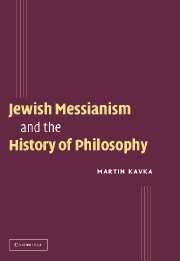Book contents
- Frontmatter
- Contents
- Acknowledgments
- List of Abbreviations
- Introduction: From Athens to Jerusalem
- 1 The Meontological Conundrum: Emmanuel Levinas and Emil Fackenheim on the Athens–Jerusalem Conflict
- 2 Beyond “Beyond Being”: Nonbeing in Plato and Husserl
- 3 Nonbeing as Not-Yet-Being: Meontology in Maimonides and Hermann Cohen
- 4 Nonbeing Ensouled, Nonbeing Embodied: Levinas versus Rosenzweig on the Role of the Other in Messianic Anticipation
- Conclusion: Deepening the Roots of the Jewish Meontological Tradition, or contra the Derridean “Messianic”
- Works Cited
- Index
2 - Beyond “Beyond Being”: Nonbeing in Plato and Husserl
Published online by Cambridge University Press: 09 July 2009
- Frontmatter
- Contents
- Acknowledgments
- List of Abbreviations
- Introduction: From Athens to Jerusalem
- 1 The Meontological Conundrum: Emmanuel Levinas and Emil Fackenheim on the Athens–Jerusalem Conflict
- 2 Beyond “Beyond Being”: Nonbeing in Plato and Husserl
- 3 Nonbeing as Not-Yet-Being: Meontology in Maimonides and Hermann Cohen
- 4 Nonbeing Ensouled, Nonbeing Embodied: Levinas versus Rosenzweig on the Role of the Other in Messianic Anticipation
- Conclusion: Deepening the Roots of the Jewish Meontological Tradition, or contra the Derridean “Messianic”
- Works Cited
- Index
Summary
Near the close of the sixth book of Plato's Republic (508d–509c), Socrates declares that the idea of the good is the cause of all truth and explicates this statement by drawing an analogy between the good and the sun. As the sun provides for the “coming to be, growth, and nourishment” of visible objects but is not itself any of these processes of becoming, so the good is the source of both existence and being without being either of these. Indeed, the good is defined as beyond being (epekeina tēs ousias, 509b). By stating that the good is superior to being, Plato leaves the Republic open to an interpretation that holds that discussions of the good – ethics – are superior to epistemological or metaphysical discussions. This view that “ethics is first philosophy” is perhaps the most common distillation of Levinas's thought. It appears throughout Levinas's writings, with specific reference to this section of the Republic. In Totality and Infinity, Levinas writes that “the Place of the Good above every essence is the most profound teaching – the definitive teaching – not of theology, but of philosophy” (TI 76/103). In the précis of the argument of Otherwise than Being, Levinas continues along these lines by asserting that the humanist reduction of the person to the historical fact is a forgetting of “what is better than being, that is, the Good” (AE 23/19).
Now it is clear that Levinas is not a thoroughgoing Platonist.
- Type
- Chapter
- Information
- Jewish Messianism and the History of Philosophy , pp. 42 - 65Publisher: Cambridge University PressPrint publication year: 2004



